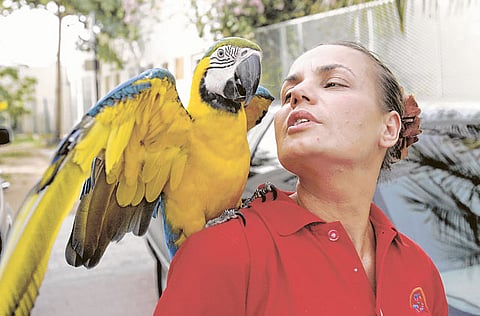The saviour: Lady 'Nightingale'
Sharing her villa with 230 animals, both domestic and wild, comes easily to Aisha

Dubai: A fox who thinks he's a dog, a deer with an eye the size of a tennis ball, a donkey who thinks he's a human being, a dog left hanging on a tree to die, another whose body was riddled with bullets… the stories Aisha, our own Florence Nightingale, has to tell are varied and plentiful.
Fortunately, most have a happy ending. The fox is domesticated and lives with the dogs, the deer's had treatment and the eye, although blinded, is back to normal size, the donkey lives in Abu Dhabi in a wildlife sanctuary, the dogs are much loved pets and live with their new families in Dubai and London.
And all these animals have Aisha Kelaif to thank for their recovery.
Losing her parents at a very young age made Aisha, an Emirati with a Dutch, British, Portuguese and Sri Lankan background, seek comfort and love in her pets. It's that love that she spreads today at her villa in Al Barsha, which has been converted into DARC, Dubai Animal Rescue Centre, a sanctuary that currently homes 230 animals, both domestic and wild.
You name it
From snakes to ponies, maras, deer, gazelle, iguanas, peacocks, hedgehogs, monkeys, alpacas and a fox, Aisha has them all. "Most of the time people call us saying they've found an abandoned animal, or own one who's at death's door and don't want it any more," says Aisha.
"Once I've been told about these animals, it leaves me with no choice. Say no and allow the animal to be euthanised, or take it home and give it love and medical care; the choice is obvious. I keep saying that it's not the animal's fault that it's in that condition. People need to be educated about animal rights, their welfare, upkeep, and our social responsibility towards them. And that's my dream.
One day I want to have an official animal rescue and education centre in Dubai. The next generation needs to be taught about their responsibility towards animals. They need to understand the difference between domestic pets and wildlife. There's a reason certain animals are called wildlife. It's because they belong in the wild, not locked up in someone's home," she says.
Aisha's message is simple: "People should be aware of what they buy as pets. Sometimes, an animal can look cute enough, but it's not meant to be a pet, so why try to lock it in a cage or keep it in your home?" she asks.
Looking after 230 unwanted animals doesn't come cheap. Although DARC relies on volunteers, Aisha works five days a week as a senior executive in the conservation department at Dewa (Dubai Electricity and Water Authority) to feed all the hungry mouths and pay the medical bills. And yet, despite the long hours, the occasional heartbreak, the high bills, Aisha goes to bed a happy woman.
"I do what I do because of my love for these animals. I have to help them. They can't speak about what they've been through. I want to be their voice. Every one of these animals shouldn't be here. They all deserve to be either in nature or with a loving family," she says.
A blessing
"It's not easy tending to their injuries and seeing their pain. One needs to be very committed and sacrifice a lot. But for every failure there are a dozen success stories. And that makes me want to go on. When there are bad days, such as when an animal has to be euthanised, or one is dying in my hands, I can't help but think I don't want to do this any more. But the good things keep me going. Every happy ending is worth unlimited sacrifices," says Aisha, who admits her life would be very lonely if she didn't have these animals to share it with.
"The way they greet me when I get home, the love they shower me with, that's not something you can find anywhere else. That sort of love can't be bought. You have to be blessed to experience it."


